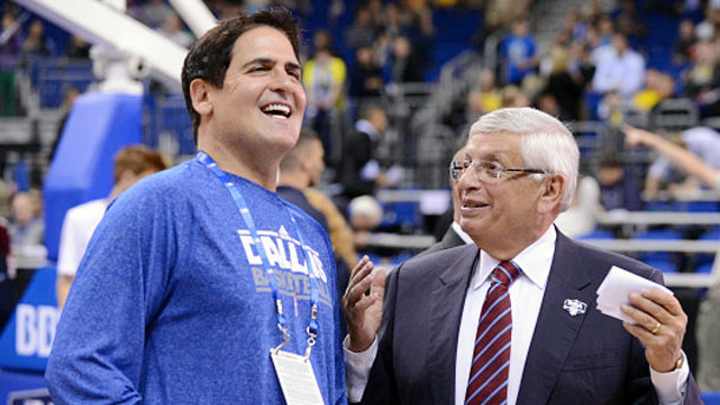Mark Cuban trolls Lakers with hard truth of NBA's luxury tax

Mavs owner Mark Cuban (left) suggested that the Lakers amnesty Kobe Bryant to lessen their luxury tax burden under the new CBA negotiated by commissioner David Stern and the players. (Garrett W. Ellwood/NBAE via Getty Images)

By Rob Mahoney
The NBA's revised collective bargaining agreement was designed to clamp down on habitual luxury tax teams -- those with ownership groups willing to stomach high payrolls and added costs in the name of title contention. Mark Cuban has historically been just such an owner, but over the last two seasons he has indicated that cavalier spending is no longer a tenable habit under the new rules.
That perspective in part explains why the Mavs broke up their core just months after winning their first title, in 2011, but Cuban -- helpful guy that he is -- also has a proposition for the Lakers in light of their impending luxury tax bill. Quoth Cuban on the Dallas-based Ben & Skin Show, as transcribed by Tim MacMahon of ESPN Dallas:
“If you look at their payroll, even if Dwight [Howard] comes back, you’ve got to ask the question: Should [the Lakers] amnesty Kobe?...I’m just saying that hypothetically. When I say amnesty Kobe, I don’t think they’d do it, but they’ve got some choices to make. Now, they’re in a big market, but they’re still limited. The Knicks, the same thing. Boston, same thing.”
It's a pure hypothetical, as Cuban notes, but might be prudent if not for the sentimentality of keeping Bryant in forum blue and gold. The Lakers would never use the amnesty provision on Kobe, just as Cuban goes on to admit that he'd rather take a financial hit than let Dirk Nowitzki go. But with the financial penalties piling up for L.A. in season after season, there's definitely merit to Cuban's jab from a financial perspective.
The Lakers may not be the Lakers without Bryant, but he alone is due to make $30.5 million next season on top of a potentially re-signed Dwight Howard and some other $45 million in guaranteed contracts. That's a huge total that would put L.A. over the tax for the third consecutive season, requiring a massive payout due to the incremental tax bracket taking effect in 2013-14 and the vicious "repeater tax" falling into place a season after.
As the rules stand in the current grace period, taxpaying teams are required to pay only a dollar-for-dollar penalty equal to the difference between their payroll and the luxury tax line ($70.3 million for this season). For the Lakers, that means that the Buss family will be on the hook for a payment of roughly $30 million in addition to $100.2 million in salary. That's a huge cost, though hardly the end of the world for a team that has paid the tax in every season since 2007-08.
Yet when we go beyond this season, we find that L.A. will soon be on the hook for far more. Assuming that the Lakers re-sign Howard on a max deal, they'll have $96.3 million in salary committed to just seven players. If the tax line remains more or less the same, that total (plus an added estimate of $6 million for five minimum-salary players to field a 12-man roster) would ramp up L.A.'s 2013-14 tax bill to almost $95 million-- all due to the NBA's new progressive tax rules. That's almost $200 million for a team that has shown no potential to actually contend for a championship, in part due to Kobe's enormous single-season salary.
It's tough to project beyond that point, given that the contracts of every Laker save Howard and Steve Nash are set to expire in 2014, but L.A. will need to be especially mindful of its payroll moving forward. From there on out, the "repeater tax" will only ramp up the penalties for frequent taxpaying teams (of which the Lakers would qualify by default, having paid the tax in the previous three seasons), giving the high-salary gambit that L.A. runs year after year a brutal side effect.
